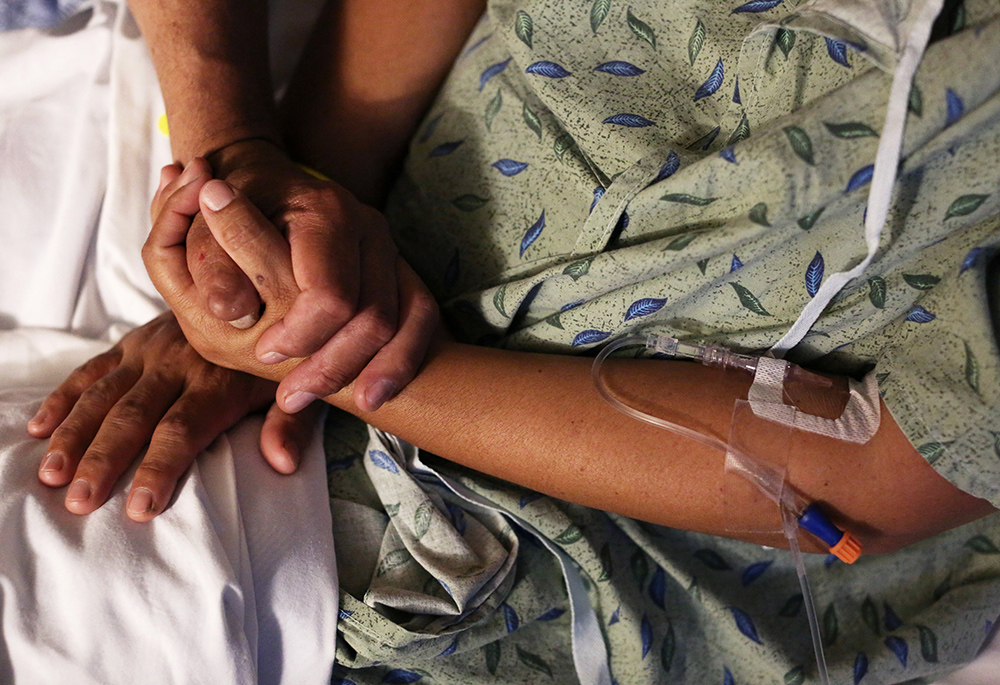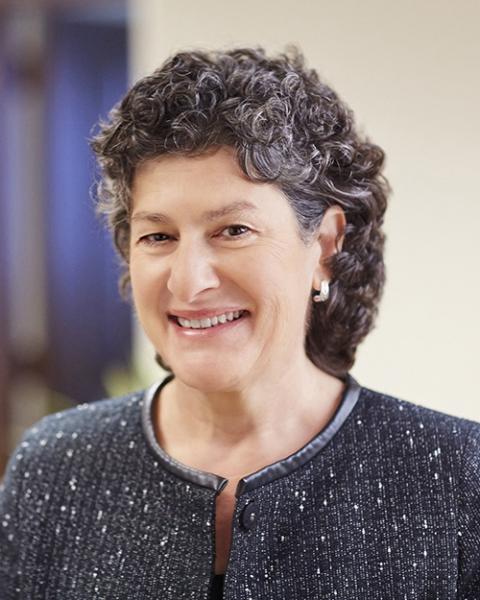
A hospital patient is comforted by a family member in this illustration photo. The U.S. Catholic bishops issued a document dated March 20 rejecting gender-affirming medical treatments for transgender individuals and reasserting that such procedures must not be performed by Catholic providers. (CNS/Reuters/Caitlin O'Hara)
As nationwide debate escalates around transgender health care — particularly when it comes to young people — the U.S. Catholic bishops issued a document rejecting gender-affirming medical treatments for transgender individuals and reasserting that such procedures must not be performed by Catholic providers.
"Any technological intervention that does not accord with the fundamental order of the human person as a unity of body and soul, including the sexual difference inscribed in the body, ultimately does not help but, rather, harms the human person," wrote members of the bishops' Committee on Doctrine in a March 20 doctrinal note titled "On the Moral Limits to Technological Manipulation of the Human Body."
Since 2019, when the Vatican Congregation for Catholic Education published "Male and Female He Created Them," which addresses "gender theory" and Catholic education, many anticipated an authoritative text from the U.S. bishops on gender identity. Yet the new doctrinal note is circumscribed; it principally covers medical interventions for people with "gender dysphoria" and emphasizes "particular care should be taken to protect children and adolescents."
In a footnote the bishops acknowledged that a "range of pastoral issues" need to be addressed regarding transgender and nonbinary people but that those are outside the scope of the statement.
The U.S. Conference of Catholic Bishops' ethical and religious directives already prohibit "elective surgeries on reproductive organs where no pathology exists," said Brian Reardon, spokesperson for the Catholic Health Association, so the new document will not change current practices at Catholic hospitals "in the near term."
"Catholic health care providers will continue to respect the dignity of our transgender patients and provide them with the same quality care we provide to all our patients," Sr. Mary Haddad, a Sister of Mercy and president and CEO of the association, said in a statement in response to the bishops' doctrinal note. "As public-serving ministries, Catholic health care providers also follow applicable federal and state laws which recognize the freedom of Catholic institutions" to follow the ethical directives "in ways that make our health care authentically Catholic."
Immediate responses to the bishops' document were mixed, with critics saying it will have far-reaching consequences.

Mercy Sr. Mary Haddad, president and CEO of the Catholic Health Association, is pictured in this 2016 file photo. (CNS/Courtesy of CHA)
Sr. Luisa Derouen, a Dominican Sister of Peace who has ministered among the transgender community since the 1990s, said the document is "not just about health care."
"The reality is that a statement like this from bishops can have negative and serious ramifications for transgender people and their families in every arena of their lives."
Craig Ford Jr. is assistant professor of theology and religious studies at St. Norbert College in De Pere, Wisconsin, where he teaches courses in Christian ethics, race, gender and sexuality, and ecclesiology.
The document lacks humility "in the face of the stories that transgender people tell about who they are as well as in the face of the emerging scientific and medical discussions around gender identity," said Ford, adding there "is still learning on both fronts, and learning takes time."
"We should be especially humble in our use of words like 'nature' and 'natural order,' especially since these have been used in the past to justify a number of moral atrocities, such as slavery," he said.
Biological sex "is not as simple as we learn in high school," said Michael Sennett, a transgender Catholic who works for a parish in the Boston Archdiocese. "The bishops who wrote this document may be dismayed to learn that biological sex is not necessarily binary — chromosomes and sex characteristics do not always line up."

Michael Sennett, a transgender Catholic in the Boston Archdiocese (Courtesy of Michael Sennett)
Sennett said intersex individuals are one example, "but this also means that someone who has a penis and was assigned male at birth may not have the typical XY chromosomes. Scientists have been saying this for a while."
"What if instead of claiming to know definitively what human nature consists in," said Ford, "we were to take a posture of listening? Transgender people are telling us just how complex the natural world that God created is."
A press release from the bishops' conference said their statement was developed in consultation with medical ethicists, physicians, psychologists and moral theologians. The document, meanwhile, cites a number of Catholic texts, among them the Catechism of the Catholic Church, works by Popes Benedict XVI, John Paul II, Pius XI and Pius XII, and Pope Francis' writings. No medical sources or studies are listed in the statement, however, and there is no indication transgender individuals were consulted.
Fr. Tadeusz Pacholczyk, director of education at the Philadelphia-based National Catholic Bioethics Center, praised the doctrinal note.
"Our personal identity is rooted in Christ, who has willed each of us in our basic maleness or femaleness," he told NCR. Seeking to redirect "our innate sex characteristics toward the opposite sex puts us on the road to heartache and a false identity."
"When it comes to the authentic core of our identity," said the priest, who holds degrees in philosophy, biochemistry, chemistry and neuroscience, "the bishops emphasize the foundational grammar of being human and being biologically sexed."
Advertisement
The nine-member doctrine committee, chaired by Bishop Daniel Flores of Brownsville, Texas, began the 14-page statement saying modern technology offers chemical, surgical and genetic interventions for the functioning of the human body, as well as for modifying its appearance. While these developments have led to the cure of many maladies, they wrote, modern technology also produces interventions that are "injurious to the true flourishing of the human person."
"Careful moral discernment is needed to determine which possibilities should be realized and which should not, in order to promote the good of the human person."
The bishops quote from Francis' "Laudato Si', on Care for Our Common Home," warning against a "technological paradigm" that treats the natural world as "something formless, completely open to manipulation."
Bishop Daniel E. Flores of Brownsville, Texas, speaks during a Nov. 17, 2021, session of the fall general assembly of the U.S. Conference of Catholic Bishops in Baltimore. (OSV News photo/CNS file, Bob Roller)
Affirming that Catholic health care services "must employ all appropriate resources to mitigate the suffering of those who struggle with gender incongruence," the committee asserted the means used "must respect the fundamental order of the human body."
"A soul can never be in another body, much less be in the wrong body," said the bishops. "This soul only comes into existence together with this body. What it means to be a human person necessarily includes bodiliness."
"Human bodiliness is, in turn, intrinsically connected with human sexual differentiation," they added, and "being man" or "being woman" is "a reality which is good and willed by God."
The bishops said there are two scenarios recognized by the church's moral tradition in which technological interventions on the human body may be morally justified: when they aim to repair a defect in the body or when the sacrifice of a part of the body is necessary for the welfare of the whole body.
"These kinds of technological interventions respect the fundamental order and finality inherent in the human person," they said.

Craig Ford Jr. (Courtesy of Craig Ford Jr.)
But there are other technological interventions, such as gender-affirming surgeries, that they said aim neither to repair some defect in the body nor to sacrifice a part for the sake of the whole. Instead, they aim to alter "the fundamental order of the body" and are not morally permissible.
Ford said the document is limited "by not taking into more conscious consideration" the context into which it was released.
"Transgender persons experience staggering amounts of violence and discrimination on the basis of their gender identity," said Ford. Between 2017 and 2021, for example, the number of transgender people who were murdered in the United States more than doubled, according to a nonprofit that tracks gun safety, with Black trans women accounting for a disproportionate number of deaths.
"To truly be Christ's community of care for all, we must strive to protect the dignity of transgender persons, making clear to all that their lives are sacred and worthy of respect," Ford said. By overlooking this opportunity to denounce violence and discrimination against transgender persons, "the document indirectly factors into the suffering — told and untold — that transgender people endure" and hinders their ability to "respond faithfully to God's call to integrity in their lives."
The statement also comes as more than 100 bills affecting transgender people — many related to health care — have been introduced by Republican state legislators so far this year.
"This is yet another document that lacks any compassion or love for transgender folks," said Sennett in Boston, where a committee is crafting guidelines on gender identity for school-age students. Like many of the more than 30 dioceses with gender and sexuality documents, Boston so far has not invited transgender individuals into the drafting process.
NCR asked the bishops' conference if there were plans to follow up with a national statement on the pastoral care of transgender individuals but as of press time had not received a response.
"Transgender people have existed since the beginning of time and we won't cease to exist," said Sennett.
Documents such as the new statement "serve to make our lives harder and promote discrimination against us," he said. "I pray for the bishops who have fallen victim to this culture war, that they find peace and healing, and seek to share the love of God with everyone in their flock."
Transitioning is not "a medical agenda out to recruit people," added Sennett. "It is a lifeline."








